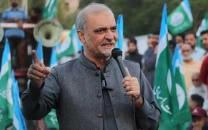Pondering the pipeline

Behind the pleasantries of diplomacy, the handshakes, the smiles and the carefully couched dialogue, a bigger issue however looms. While Mr Hague and before him Mr Holbrooke both say the pipeline is an internal matter, we all know that in reality Islamabad is under much pressure to wriggle out of the deal. It is currently attempting to find some means to throw off the pressure piled on to its aching back. Can it do so? We can only wonder.
The fact is that the recent flurry over the pipeline – essential in the eyes of many experts to meeting our energy needs – has left many in the country pondering deep issues. The key one of course is that of Pakistan’s sovereignty and its ability to make decisions for itself and its people. This ability has been undoubtedly compromised by the fact that Islamabad is, at present, deeply dependent on Washington, in terms of politics and economics. For its leaders, the pipeline problem presents an interesting quandary. It has become a kind of test case to see if Islamabad has the tools required to put forward its own case strongly enough and assert its own will over that of its allies as far as the pipeline goes, on the basis of its own needs and the welfare of its people.
Published in The Express Tribune, June 26th, 2010.



















COMMENTS
Comments are moderated and generally will be posted if they are on-topic and not abusive.
For more information, please see our Comments FAQ